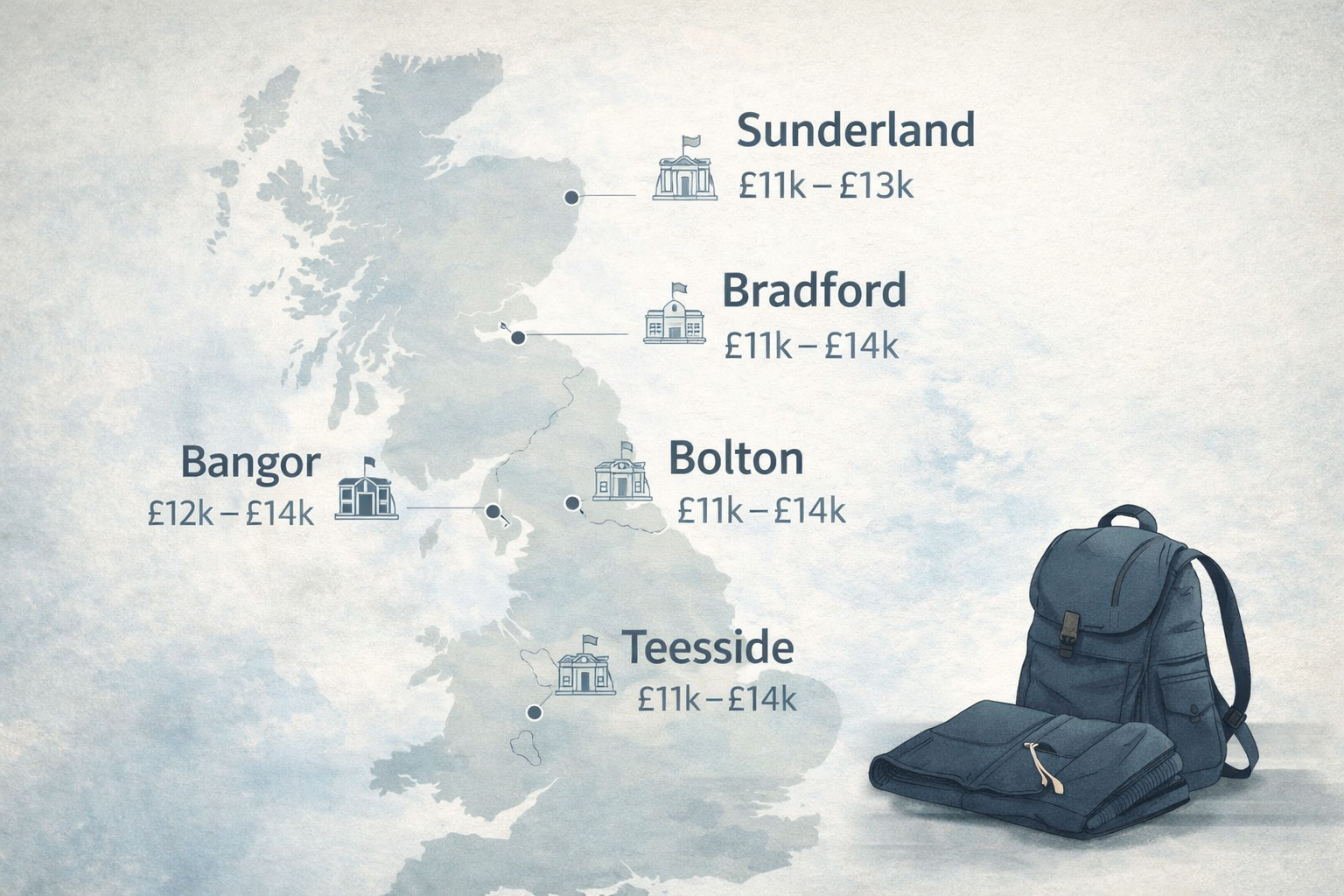Well, I will tell the truth to you. The first impact that came to my mind was, when pre-masters in the UK was explained to me: Is it just another means of garnering more money out of the international students?
However, here is the thing, after a deeper investigation and some conversations with dozens of students who travelled down this road, I have an entirely different song to sing. The courses last anywhere between ten weeks and a year, and they have finally provided a way of solving a problem that has been annoyingly sitting over the heads of international students for years (Top UK Universities Offering Pre-Masters Programs: 2025 Guide | UniAcco), and that problem is upon admission, they are not prepared to study at that level.
The reality is you can begin jumping into a UK masters program and it feels like drinking out of a fire hose (and you are on a unicycle). The culture shock with academics is indeed a thing, and many smart students do still not know how to find their path in a completely new educational environment.
This is where specialized agencies such as GCRD Hub play their roles in providing customized academic placement services to students through which they can get the proper pre-masters path in the UK. However, before we wade into the mire of the specifics of how these shows are done, just to give you an idea of what you are really getting into, consider this.
The Reality Check: What Makes UK Master’s Programs So Different?
I remember speaking with Priya, a software engineer from Mumbai, who told me something that stuck: “I had a 3.8 GPA from one of India’s top engineering colleges, but my first essay feedback in the UK literally made me question if I could speak English.”

That’s not an isolated experience. UK postgraduate education operates on a completely different wavelength than most international systems. It’s not just about memorizing facts or even critical thinking—it’s about developing what academics call “independent scholarly voice.”
The Academic Style Maze
British academic writing follows unwritten rules that can perplex even native speakers. You’re expected to:
- Challenge established theories (respectfully, of course)
- Build arguments through nuanced analysis rather than definitive statements
- Master the art of “critical evaluation” without being, well, too critical
- Navigate citation styles that seem designed to test your patience
And don’t get me started on seminar discussions. The expectation to contribute meaningfully to debates about topics you’re still wrapping your head around? That’s a skill that takes time to develop.
Understanding Pre-Masters in the UK: The Academic Stepping Stone
So what exactly is a pre-masters in the UK? Think of it as academic boot camp, but in the best possible way.

The Pre-Masters programme at the International College offers a path to a masters for international students at the University of Sheffield. This programme is designed in collaboration with the University and is delivered by Study Group. The Pre-Masters is an intensive 1.5 or 2-semester programme (Pre-Masters in the UK | University of Sheffield IC).
But here’s where it gets interesting—these aren’t just generic English language courses. They’re highly specialized programs that bridge the gap between your educational background and UK postgraduate expectations. A pre-masters in the UK is essentially your academic passport to success.
The Three Pillars of Pre-Masters Success
- Academic Skills Development: Learning to write like a British postgraduate student (spoiler: it’s harder than it sounds)
- Subject-Specific Preparation: Getting up to speed with UK approaches to your chosen field
- Cultural Academic Integration: Understanding the unspoken rules of British higher education
The Cost Reality: Is It Worth the Investment?
Let’s talk numbers because I know that’s what you’re thinking about.
The cost of a Pre-Masters in the UK depends on the university and the programme’s duration. Typically, tuition fees range from £7,000 to £15,000 per year (Pre-Masters Courses in the UK for International Students). But here’s the kicker—UK students can expect to pay between £3,495 and £9,500 for an entire course. Not all universities charge higher fees for international students, but those that do may charge as much as £18,000-23,000 (The benefits of studying a pre-masters course in the UK).
I know what you’re thinking: “That’s a lot of money for what sounds like an extended prep course.” But consider this alternative scenario: failing or struggling through your master’s program, potentially having to repeat modules, or worse, not completing your degree at all.
When you factor in the comprehensive support services—including scholarship and financial aid support that organizations like GCRD Hub provide—the investment in a pre-masters in the UK becomes much more justifiable.
The Hidden Costs of Skipping Pre-Masters
| Scenario | Direct Entry | Pre-Masters Route |
| Success Rate | 65-75% | 85-95% |
| Average Grade | Merit (60-69%) | Distinction (70%+) |
| Stress Level | High | Moderate |
| Time to Adaptation | 6-8 months | 2-3 months |
| Overall Satisfaction | Moderate | High |
Entry Requirements: The Gateway Criteria
Here’s where things get practical. The typical requirements for pre-masters in the UK include: finishing an undergraduate degree with at least a pass and having an IELTS minimum score of 5.5 in all skills.
But don’t let those “minimum” requirements fool you. Different universities have different standards, and the reality is more nuanced than most admission websites suggest.
The Typical Pre-Masters Candidate Profile:
- Bachelor’s degree (2:2 or equivalent)
- IELTS 5.5-6.5 (depending on program)
- Some work experience (preferred but not always required)
- Clear motivation for postgraduate study
What I find fascinating is that these programs aren’t just for students with lower grades. I’ve met plenty of high-achieving students who chose pre-masters routes simply because they wanted to maximize their chances of getting into their dream university.
Duration and Structure: Time Investment Decoded
One or two semesters depending on your English language level (Pre-Masters Programme | University of Surrey ISC). But here’s what that actually means in practice:
- Short-Track Programs (10-15 weeks): For students who are academically ready but need cultural and methodological adjustment
- Standard Programs (1-2 semesters): The most common route for pre-masters in the UK, covering comprehensive academic preparation
- Extended Programs (up to 1 year): For students who need significant English language development alongside academic skills
The beauty of this flexibility is that you’re not locked into a one-size-fits-all approach. Universities assess your individual needs and recommend the appropriate duration for your pre-masters in the UK journey.
University Partnerships: The Elite Connection
Here’s something that might surprise you: many pre-masters programs are run by prestigious universities themselves, not just private colleges.
Route to success: Between 2022-24, previous IPM students went on to UCL, Imperial, LSE, University of Warwick, University of Manchester and other leading UK universities (International Pre-Master’s | UCL Centre for Languages & International Education (CLIE) – UCL – University College London).

This isn’t just about getting into “any” master’s program—it’s about accessing the top tier of UK higher education with better preparation and support. These partnerships make pre-masters in the UK a genuinely strategic choice.
Notable University Pre-Masters Programs:
- University of Sheffield International College
- UCL Centre for Languages & International Education
- Durham University ISC
- University of Surrey ISC
- University of Sussex ISC
The Subject Pathway System
One aspect that doesn’t get enough attention is how specialized these programs can be. You’re not just learning generic academic skills—you’re preparing for your specific field of study through targeted pre-masters in the UK pathways.
Common Pathway Specializations:
- Business and Management
- Engineering and Technology
- Life Sciences and Medicine
- Social Sciences
- Arts and Humanities
- Law and Legal Studies
Each pathway includes subject-specific modules, terminology, and methodological approaches that will be crucial for your master’s studies.
The Application Process: Navigating the System
This is where services like GCRD Hub’s end-to-end admissions support really shine. The application process for pre-masters programs can be surprisingly complex, especially when you’re trying to coordinate with your eventual master’s program application.
The Strategic Application Timeline:
- Research and university selection (6-8 months before)
- Application submission (4-6 months before)
- Visa application process (2-3 months before)
- Pre-departure preparation (1-2 months before)
The key is ensuring your pre-masters program aligns with your intended master’s degree and university preferences. Professional guidance can make this process significantly smoother.
Success Stories: The Real-World Impact
Let me share a story that illustrates the real value of these programs. Ahmed, a mechanical engineer from Egypt, had decent grades but struggled with academic writing. He was accepted into a direct-entry master’s program at a mid-tier university but chose to do a pre-masters instead.
The result? After his pre-masters, he not only got into Imperial College London but also thrived in his master’s program, graduating with distinction and landing a job at a major engineering firm.

The Transformation Factor
What makes pre-masters programs particularly effective is their focus on:
- Developing critical thinking in the British academic context
- Building confidence in English academic communication
- Creating study strategies specific to postgraduate demands
- Establishing professional networks early
The Post-Brexit Landscape: New Opportunities
Here’s something interesting that’s emerged post-Brexit: UK universities are increasingly focused on attracting high-quality international students, and pre-masters programs have become a key strategy for ensuring student success.
An Extended Masters begins with a full-time 10-week programme (for July 2025 intake) covering four modules that have been designed to raise your skills to postgraduate standard (Pre-Masters Courses | University of West London).
This trend toward “extended” and “integrated” programs shows how seriously universities are taking the preparation phase for pre-masters in the UK.
Making the Decision: Is Pre-Masters Right for You?
The decision ultimately comes down to your personal circumstances and goals. Here are some questions to consider:
- Are you confident in your academic English writing abilities?
- Do you have experience with independent research and critical analysis?
- Are you familiar with UK academic culture and expectations?
- How important is maximizing your chances of getting into a top university?
- Can you afford the additional time and financial investment?
If you answered “no” to the first three questions and “yes” to the last two, exploring pre-masters in the UK might be exactly what you need to bridge that gap successfully.
The Support System: Beyond Academics
What I particularly appreciate about established providers like GCRD Hub is their comprehensive approach. It’s not just about getting you into a program—it’s about ensuring you succeed once you’re there.
From their London office at 107-111 Fleet Street, they provide everything from pre-departure orientation to ongoing support throughout your studies. You can reach them at +44 7756 428968 for personalized guidance on your pre-masters journey.
| Support Type | Pre-Masters Phase | Masters Phase |
| Academic Support | Study skills, writing techniques | Research methodology, dissertation help |
| Language Support | Academic English, presentation skills | Advanced communication, professional writing |
| Cultural Integration | University systems, peer interaction | Professional networking, career guidance |
| Practical Support | Accommodation, banking, healthcare | Work placements, visa extensions |
The reality is that studying in the UK involves challenges that go far beyond academics, and having comprehensive support can make the difference between struggling through and truly thriving.
Looking Forward: The Future of Pre-Masters Education
Into 2025 and beyond I am looking to see some interesting trends in pre-masters education:
- Growth of Specializations: Specializations of programs are growing more into certain career choices as well as industry needs.
- Technology Integration: The use of VR to show tours of the campus, the use of AI to support language learning, and tools great at online collaboration are becoming the norm.
- Employer Partnerships: The experience that involves mentorship in industry and work is added in more programs.
- Flexible Delivery: There is an increased number of hybrid and online delivery choices, but the essential experience stays with the campus.
Your Academic Investment Strategy The Bottom Line
In taking up a pre-masters in the UK, you are not buying time but rather a foundation that is going to influence the rest of your postgraduate life in the UK and beyond.
Students who have discussed completion of a pre-masters program with me have always indicated greater satisfaction of master program, higher grades and professional networks. They also say something somewhat intangible yet critical in regard, namely, confidence.
To provide you with an end-to-end service in navigating the pre-masters terrain, such as scholarship offers, facilitating access and negotiating with academic placement facilities in universities, GCRD Hub provides a custom service at their London office. Their team is exposed to the details of the UK education system and they are the best people to assist you in making the best decision concerning your pre-masters journey.
Keep in mind that it is not enough to pass to a master program, but to do well there. And sometimes, the only thing that helps to run a marathon is to start to run it with adequate training. A pre-masters in the UK might just be the training you need.

Frequently Asked Questions
Q: Can One have a good IELTS score and still apply to a pre masters course?
A: Absolutely. Pre-masters do not end with the English language skills; it comes down to the academic preparation and cultural acclimatization. Such programs are also immensely helpful to many students whose IELTS is 7.0+.
Q: Are pre-masters qualifications recognised by all the UK universities?
A: Pre-masters qualifications are known by most good UK Universities, and particularly those by established pathway providers. Nevertheless, make sure to check acceptance in your target universities before the enrolment.
Q: Can I switch my subject area upon the successful completion of pre-masters program?
A: This is according to program and the university. There are very flexible some pre-masters programs and there are pathway-specific post-masters programs. It is what should be made clear in the process of application.
Q: Can one do pre-masters in order to do a PhD?
A: Yes, there are a lot of universities which provide pre-doctoral programs, which is not so common as pre-masters ones. It is often emphasized on research methodology and writing at doctorate level.
Q: What occurs in case I do not pass progression?
A: The majority of programs have support and even extra time that you may use to fulfill requirements. Nonetheless, one should be aware of particular criteria of progression and the support that will be provided before it is enrolled.





